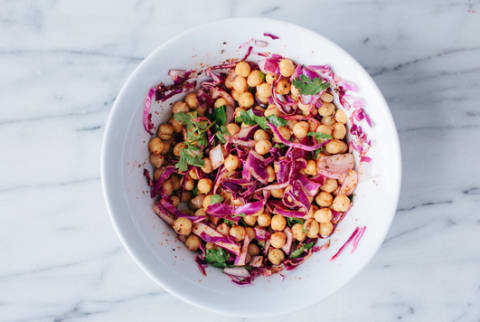Advertisement
3 Common Mistakes To Avoid If You're Going Meat-Free



Whether you have decided to go vegetarian for the animals, the environment, to achieve weight loss, to improve your overall health, or for all of the above reasons—congratulations!
No matter how you slice it, you made the right choice. Consuming a diet rich in fruits and vegetables greatly affects every aspect of existence as we know it.
The unfortunate news is that the transition to vegetarianism isn't always stress-free. The good news is that this article will prevent you from sabotaging your own good intentions. You will learn how to avoid making the three most common mistakes that are rampant among those new to the plant-based lifestyle.
Many new vegetarians feel like fish out of water. The early days are all about figuring out how to live life again. What to order at restaurants, what to prepare for lunch during the workweek, what to eat while on the road, relearning how to shop for groceries, etc. When eliminating meat from your diet, everything must be considered from a new perspective.
Going vegetarian has a unique way of making you realize just how much of your life is actually affected by food.
When eliminating meat from your diet, everything must be considered from a new perspective.
Below are three monumental mistakes that I was personally guilty of committing as a new vegetarian. Throughout the years, I have witnessed other vegetarians all over the world making these same mistakes. To save you a ton of time, energy, and frustration, this article will serve as the facilitator of your vegetarian enlightenment.
1. Put down the cheese.
Replacing meat with cheese is the biggest mistake that new vegetarians make. It has rightfully earned its place at the top of this list.
I fell into the cheese trap immediately after abandoning meat. I was like most people who are falsely convinced that humans require massive amounts of protein to achieve good health or weight loss (the next item on this list will provide an explanation as to why this protein myth is just not true).
When I was first transitioning to a vegetarian diet, I truly believed that since I was no longer obtaining protein from meat, I had no choice but to increase my intake of cheese.
Needless to say, during the first two years of living as a vegetarian, I consumed nothing but vegetarian pizza, cheese fries, bean and cheese quesadillas, salad topped with shredded cheddar cheese, etc. If a meal contained cheese and vegetables, it was on my plate.
Unfortunately, most cheese is a processed food that offers very few health benefits and can be high in fat and should be consumed in moderation. This doesn't mean you should deprive yourself of cheese (or any food for that matter), but being thoughtful of your intake can help prevent health issues later on.
2. Bring on the carbs.
Allow me to take a moment to debunk the widely believed myth that humans require massive amounts of protein to shed weight. This is not true. The recommended intake of protein for adults is 0.8-1.0 grams per kg, but to cover your amino acids bases, someone on a vegetarian diet may need close to 1.0 grams of protein per kilogram of body weight.
Yes, the body requires some protein to remain balanced, but what the body really craves are carbohydrates.
When I use the word “carbohydrates,” I'm not referring to refined grains, but instead foods like fruits and vegetables, rice, beans, and potatoes which are less processed than most bagels, cereal, and pastas.
Sure, the latter options might be less expensive and more versatile, but while these processed carbohydrate sources provide calories and carbs, they typically lack other nutrients like fiber, which helps you feel satisfied and prevent you from overeating. Additionally, many of these processed carbs are packed with sugar and additives that aren't doing your body any favors.
When you're craving bread, rest assured, you do not have to give it up! Instead, experiment with almond flour, rice flour, or chickpea flour. These natural alternatives are packed with nutrients and will satiate your cravings.
If your goal is optimal health and wellness, you must make an actual effort to consume a diet rich in whole, plant-based foods. Do not replace meat with flour. Do not replace meat with cheese. Replace meat with the mineral- and vitamin-packed carbohydrates that your body craves.
3. Step away from the freezer section.
I cannot tell you how many frozen veggie burgers and “chicken” patties I consumed during my first two years as a vegetarian. Needless to say, I topped both varieties with cheese. And, of course, I believed that I was one bite away from total health.
Even without the added cheese, these “healthy” meat alternatives should never be a staple in your diet. Sure, they are convenient and taste great, but like cheese and flour, they aren't natural. They are usually modified and processed products that new vegetarians tend to gravitate toward because they are easy to heat up and do not require hours of experimenting in the kitchen.
The whole idea behind consuming a plant-based diet is to increase the levels of vitamins and nutrients in the body. This means that we must eat whole food directly from the garden—not from the freezer section.
Overcome the fear of experimenting in the kitchen. Purchase a vegetarian or vegan cookbook and commit to making your own natural plant-based meals. Your health and waistline will thank you.